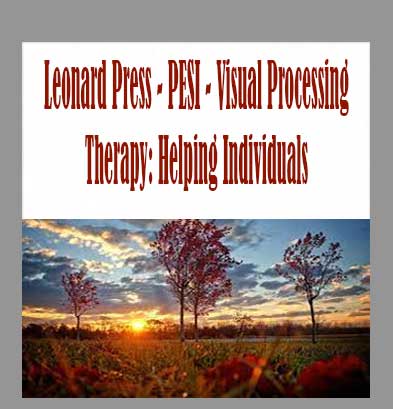
Description
Leonard Press – PESI – Visual Processing Therapy: Helping Individuals with Sensory Processing Disorders, ADHD, Autism, Dyslexia and Acquired Brain Injury download, Leonard Press – PESI – Visual Processing Therapy: Helping Individuals with Sensory Processing Disorders, ADHD, Autism, Dyslexia and Acquired Brain Injury review, Leonard Press – PESI – Visual Processing Therapy: Helping Individuals with Sensory Processing Disorders, ADHD, Autism, Dyslexia and Acquired Brain Injury free
Leonard Press – PESI – Visual Processing Therapy: Helping Individuals with Sensory Processing Disorders, ADHD, Autism, Dyslexia and Acquired Brain Injury
Watch internationally renowned expert and author in vision therapy, Leonard Press, O.D., FAAO, FCOVD, and learn the role of vision beyond eyesight. Dr. Press will show you how learning-related vision problems present in individuals with Sensory Processing Disorders, ADHD, autism, dyslexia, and acquired brain injury as well as practical interventions to develop visual abilities with your clients.
Watch this recording and learn to differentiate visual efficiency from visual processing as well as effective screening tools to identify visual problems. You will learn strategies to collaborate with developmental optometrists. The sample procedures that will be demonstrated will enable you to help a wide variety of patients having difficulty with visual processing. This course will leave you with a new and exciting perspective on visual processing and therapy.
Walk away with the strategies necessary to:
- Differentiate vision from eyesight and vision screenings from eye examinations
- Identify children and adult with vision problems
- Provide learning procedures to improve visual processing abilities
- And more!
Speaker
Leonard J. Press, OD, FAAO, FCOVD
Vision Press
Leonard J. Press, OD, FAAO, FCOVD, is board-certified in optometric vision therapy by the College of Optometrists in Vision Development. He is a diplomate of the American Academy of Optometry in Binocular Vision and Perception and is the Editor-in-Chief of the peer-reviewed journal, Vision Development & Rehabilitation. A graduate of the Pennsylvania College of Optometry, where he completed his residency in Pediatrics and Binocular Vision, Dr. Press served as chief of the pediatric unit at the Eye Institute of the College. He subsequently served for 15 years as chief of the vision therapy service at the State University of New York’s College of Optometry.
Dr. Press is a consultant on visual disabilities for the National Board of Medical Examiners. He is past-president of the New Jersey Society of Optometric Physicians, and of the College of Optometrists in Vision Development. He is current chair of the Pediatrics/Binocular Vision Committee of the American Optometric Associations. Author of three textbooks and over 100 articles in ophthalmic journals, Dr. Press presents continuing education lectures and seminars on vision nationally as well as internationally. He is optometric director of the Vision and Learning Center in Fair Lawn, New Jersey, one of the first sites in the country to be accredited as a private practice residency program for vision therapy and rehabilitation.
Speaker Disclosures:
Financial: Dr. Leonard Press maintains a private practice. He is in a leadership position with the Vision and Learning Center. He is an author for Mosby and Butterworth-Heinemann publishers and receives royalties. He receives a speaking honorarium from PESI, Inc. He has no relevant financial relationships with ineligible organizations.
Non-financial: Dr. Leonard Press is a diplomat of the American Academy of Optometry in Binocular Vision and Perception. He is a consultant for the National Board of Medical Examiners. He is the current chair of the Pediatric/Binocular Vision Committee of the American Optometric Associations.
Target Audience
Occupational Therapists, Occupational Therapy Assistants, Physical Therapists, Physical Therapy Assistants, Speech-Language Pathologists, Educators
Outline
- Visual Efficiency
- The neurodevelopment of eye tracking, accommodation and binocular vision
- Visual Processing
- How the eyes interface with the rest of the brain and body
- Vision problems as neurodevelopmental disorders
- Vision problems as sensory processing disorders
- Visual perceptual testing: Standardized and observational
- How Developmental Optometry Relates to Occupational Therapy and Other Disciplines
- Jean Ayres, Brain Gym and developmental vision
- Collaboration between therapeutic interventions
- Signs and symptoms of undiagnosed or untreated vision disorders
- Convergence Insufficiency Symptom Survey (CISS)
- Optometric application of lenses and prisms
- The Neuroplasticity and
- Neuroadaptability of the Visual System
- What goes wrong visually, why it goes wrong, and what we can do about it
- Is there an age at which it’s too early or late to intervene?
- Visual problems as early red flags for autism spectrum disorder
- Learning-based vision problems and academic performance
- Post-trauma vision disorder and other problems of acquired brain injury
- Hands-on Demonstration of Screening Procedures
- PLRG the penlight red/green standardized convergence insufficiency screening
- Visual tracking and head movement
- Visual tracking and the midline plane
- Near-far focusing flexibility
- Information for referral and collaboration
- Overview of Sample Therapeutic Activities
- Nearpoint of convergence and touch
- Physiological diplopia and divided attention
- Hart Chart Saccadic
- Pointer-in-straw in three dimensions
- Central/peripheral awareness
- Press Lites
Objectives
- Compare and contrast eyesight and vision.
- Define the role of vision in early intervention.
- Identify visual problems impacting learning.
- Describe common ground between other therapies and vision therapy.
- Explain how to screen for vision disorders.
- Formulate therapeutic interventions for vision problems.
Frequently Asked Questions:
- Innovative Business Model:
- Embrace the reality of a genuine business! Our approach involves forming a group buy, where we collectively share the costs among members. Using these funds, we purchase sought-after courses from sale pages and make them accessible to individuals facing financial constraints. Despite potential reservations from the authors, our customers appreciate the affordability and accessibility we provide.
- The Legal Landscape: Yes and No:
- The legality of our operations falls into a gray area. While we lack explicit approval from the course authors for resale, there’s a technicality at play. When procuring the course, the author didn’t specify any restrictions on resale. This legal nuance presents both an opportunity for us and a boon for those seeking budget-friendly access.
- Quality Assurance: Unveiling the Real Deal:
- Delving into the heart of the matter – quality. Acquiring the course directly from the sale page ensures that all documents and materials are identical to those obtained through conventional means. However, our differentiator lies in going beyond personal study; we take an extra step by reselling. It’s important to note that we are not the official course providers, meaning certain premium services aren’t included in our package:
- No coaching calls or scheduled sessions with the author.
- No access to the author’s private Facebook group or web portal.
- No entry to the author’s exclusive membership forum.
- No direct email support from the author or their team.
We operate independently, aiming to bridge the affordability gap without the additional services offered by official course channels. Your understanding of our unique approach is greatly appreciated.
- Delving into the heart of the matter – quality. Acquiring the course directly from the sale page ensures that all documents and materials are identical to those obtained through conventional means. However, our differentiator lies in going beyond personal study; we take an extra step by reselling. It’s important to note that we are not the official course providers, meaning certain premium services aren’t included in our package:
Refund is acceptable:
- Firstly, item is not as explained
- Secondly, Item do not work the way it should.
- Thirdly, and most importantly, support extension can not be used.
Thank you for choosing us! We’re so happy that you feel comfortable enough with us to forward your business here.







Reviews
There are no reviews yet.